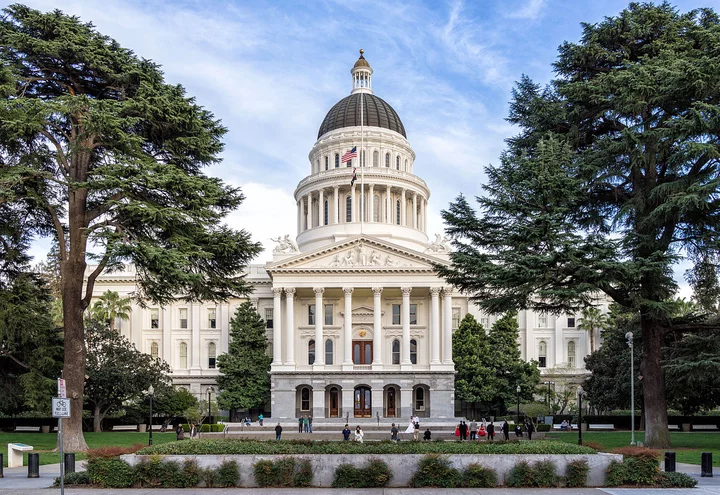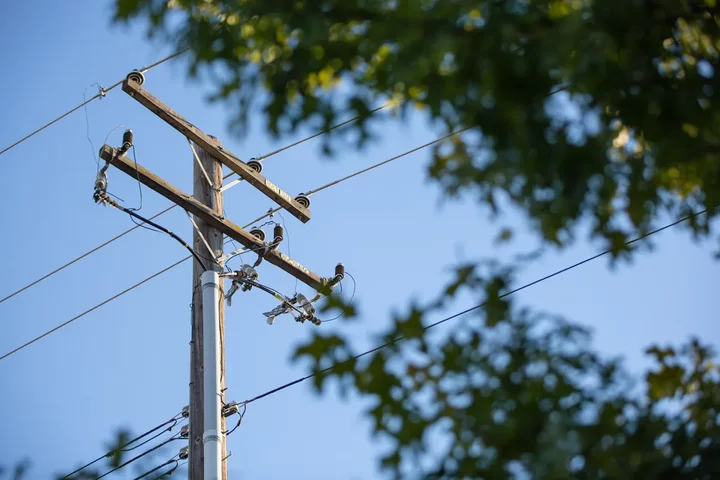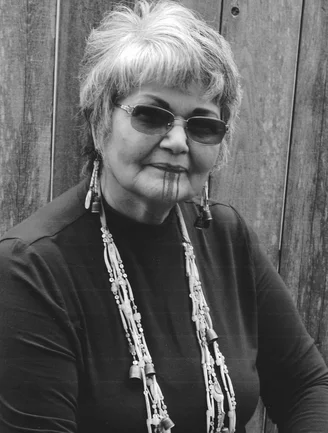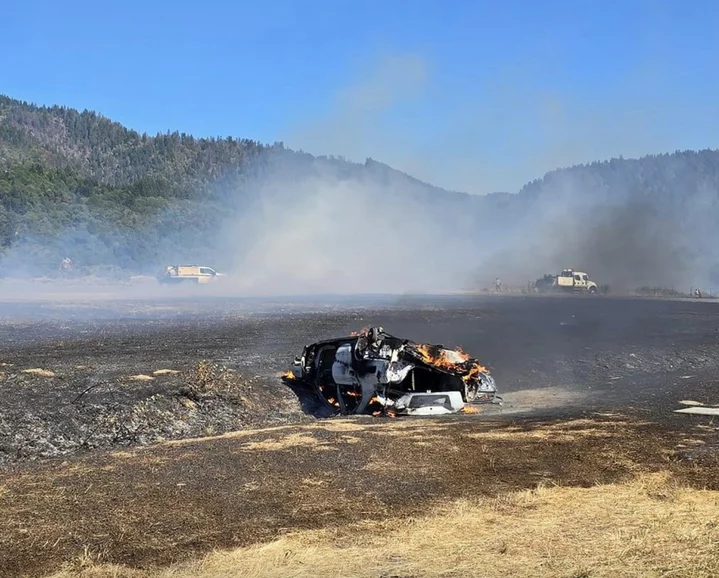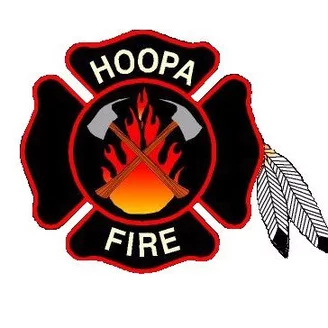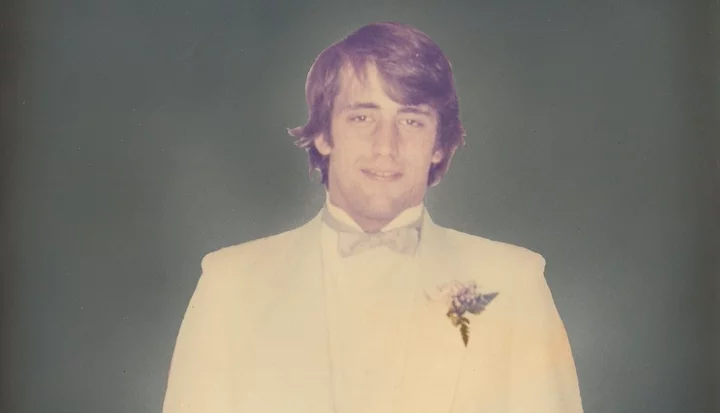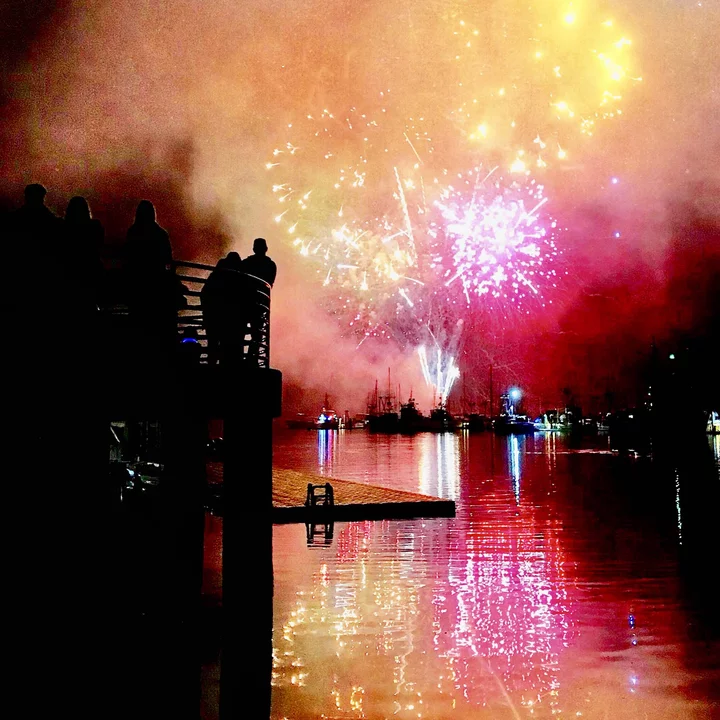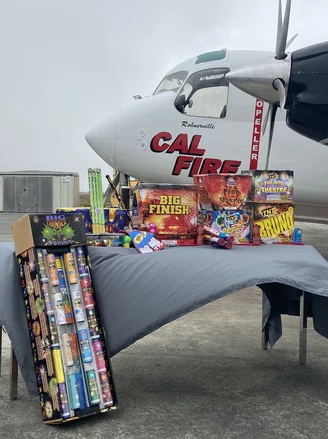How a ‘Once in a Century’ Broadband Investment Plan Could Go Wrong
Khari Johnson / Wednesday, July 3, 2024 @ 7:24 a.m. / Sacramento
Illustration by Adriana Heldiz, CalMatters.
Starting next week, California residents have 30 days to challenge maps that will determine how $1.8 billion is distributed to increase internet access in the state.
Actually getting the California Public Utilities Commission to accept changes to the federal maps is quite difficult, which internet access advocates with educational backgrounds are raising alarm over.
For example, after the COVID-19 pandemic hit and teachers at the Fresno Unified School District started teaching classes remotely, Philip Neufeld started work to ensure 7,000 students could log on.
Neufeld, a district IT worker and member of the Fresno Coalition for Digital Inclusion, started noticing patterns. He heard about students going to Taco Bell and McDonald’s for WiFi to do their homework, but he saw comparatively low download speeds across entire neighborhoods, disparities that reminded him of redlining, the practice of denying people housing and wealth based on their race. Neufeld and a colleague built an open source tool to gather 14 million speed tests across Fresno over the span of two years.
“What it shows is that it’s not just people in rural areas who have a real need for better internet,” he said. “It’s people in urban, low-income neighborhoods in apartment buildings and mobile home parks, and these patterns are showing up across multiple large cities that have higher poverty.”
Data collected from students in Fresno mirrors “digital redlining” documented in other parts of the United States. But the government won’t use data like the kind collected in Fresno to redraw a map that will decide how to distribute the money because Neufeld’s data doesn’t conform precisely to the strict challenge process that’s been put in place. That’s one of a number of ways advocacy groups say the process to challenge how funding for affordable high-speed internet is difficult. Some advocates have gone so far as to suggest the challenge process is broken by design.
‘Once in a century’ broadband funding
Shortly after the COVID-19 pandemic exposed areas of the digital divide — the gap between people with ready access to reliable internet and those who don’t — for students and workers, Congress passed an infrastructure bill in 2021 to invest more than $42 billion in broadband internet projects in all 50 U.S. states and six territories. California got $1.8 billion for such projects. A U.S. Department of Commerce agency oversees the program and the California Public Utilities Commission distributes the money to local projects.
Government officials and advocates alike refer to the Broadband Equity Access and Deployment, or BEAD program, as a once in a generation or, as a contractor working with the California Public Utilities Commission put it, a “once in a century” investment in affordable high-speed internet access.
But advocates say maps compiled with data provided by internet service providers are highly inaccurate while the challenge process is short, arduous, and unfairly places the burden of proving that inaccuracy on people in areas unserved or underserved. They warn this could lead to the once in a generation money being misspent.
How to challenge government internet access maps
Anyone can visit a state online portal to find out if their home or nearby community institutions are designated as eligible for funding, or if the map inaccurately says they have internet access or adequate internet speed. They can use the same portal to run tests to challenge things about their home internet like speed or latency. Successful challenges can change a home designation, but there’s no guarantee that the challenge will make a difference because only certain parties can challenge the maps.
Only local and tribal governments, internet service providers, and advocacy groups can demand changes to the map, and so in order for an individual who challenges claims about their internet access to be heard, one of these groups must verify the evidence gathered by an individual and claim their challenge in order for it to be recognized by state and federal agencies.
Among more than 80 such organizations registered to participate in the challenge process, roughly two dozen are municipal, county, or tribal governments.
To successfully challenge internet speeds, an individual must carry out speed tests three times a day over the span of three days and provide details. They must also subscribe to a broadband speed plan or the highest tier plan available from an internet service provider.
“What it shows is that it’s not just people in rural areas who have a real need for better internet.”
— Philip Neufeld, IT worker, Fresno Unified School District
Inspired by Neufeld, Oakland Undivided did a similar speed test in late 2023 in partnership with the Oakland Unified School District and HubbleIQ. There they found that more than half of 18,000 students had download speeds that would qualify for BEAD funding and heat map patterns that resemble historical redlining. Speeds are 10 times better in high income neighborhoods in the area serviced by AT&T, Comcast, Sonic, and T-Mobile, but the FCC map shows that adequate coverage is nearly ubiquitous throughout the city of Oakland.
“We’ve been talking with a lot of other digital equity coalitions around the state in Fresno, LA, and we kind of all agree that this process is designed to make it impossible for communities to submit data,” said Patrick Messac, director of Oakland Undivided, a nonprofit organization started during the COVID-19 pandemic that last year critiqued a map for distributing billions of dollars for a state broadband program.
Because of the difficulty involved with collecting speed test data, Oakland Undivided changed focus from speed tests and the challenge process to instead seek greater internet availability for community institutions. But Messac, who also works in IT for the city of Oakland, worries that the federal broadband dollars could get depleted before places like schools, libraries, and Head Start centers would be in line for funding.
“What we are finding, and others have noted as well, is that the National Map overstates coverage,” said Adeyinka Ogunlegan, the vice president of government affairs and policy for EducationSuperhighway.
That group is focused on improving internet speeds in apartment buildings since roughly 1 in 4 people who lack internet access live there. It’s one of the only organizations nationwide planning to mount challenges in all 50 U.S. states, with 800 planned challenges in California alone. EducationSuperhighway is also choosing to focus on availability challenges instead of speed tests. Ogunlegan wouldn’t go so far as to say the challenge process is designed to fail, but said it’s difficult for organized groups that have followed the process for years to participate, so it must be challenging for the average individual as well. Making people call internet service providers instead of using an online tool, for example, makes it harder to gather evidence that an internet provider does not offer services at your address.
John Windhausen is executive director of Schools, Health, and Libraries Broadband Coalition, a nonprofit organization with hundreds of member groups. He’s hearing from members that the challenge process is very difficult.
“We are concerned that internet service providers allege that they serve areas but many locations cannot receive the level of service required by the BEAD program,” he said.
Alexis Schrubbe is director of the Internet Equity Initiative at the University of Chicago and a member of the National Broadband Mapping Coalition. She helped make an open source tool for residents to carry out speed tests and agrees with other broadband experts who say the map for allocating the federal funding overstates coverage. She encourages anyone dissatisfied with their internet to mount a challenge and take the opportunity to participate. It can seem like a lot of labor but it’s really not for a once-in-a-lifetime chance.
“This is everybody’s best chance to have their complaint heard, so they should take advantage of it,” she said. “Don’t be afraid to ask questions, and don’t be intimidated by the process. It’s our best chance to make the maps right and to stand up and advocate for ourselves.”
‘(California) should be a leader in this space’
The challenge process for the federal money in California begins July 3 and ends Aug. 5. After the public submits challenges to the map, internet service providers get their chance to rebut those challenges. The California Public Utilities Commission expects to make final determinations by the end of the year.
Initiatives to narrow the digital divide started to backslide in recent months with the loss of the federal Affordable Connectivity Program subsidy in April.
In more positive news, 10 affordable broadband projects received initial approval last week. The public utilities commission is slated to make a final decision with a vote in August. Also last week: the Federal Communications Commission said it plans to modernize its E-Rate program. A change, if adopted at a July 18 meeting, would allow more schools access to funding to loan students Wi-Fi hotspots for use at home.
Both internet service providers and groups passionate about ending the digital divide are campaigning for AB 2239, a draft bill that defines digital discrimination to broadband internet access and allows city attorneys and district attorneys to file suit against internet service providers.
However the challenge process turns out, Neufeld wants state education groups to continue to routinely run speed tests on devices loaned to students. If anonymized and made into a formal process, the tests could inform broadband investments or prove patterns of neglect that can lead to legal action under AB 2239 in order to hold internet service providers to account.
“We [California] should be a leader in this space,” he said. “There’s no reason at a state level that we couldn’t have a better way of mapping users’ real experience.”
###
CalMatters.org is a nonprofit, nonpartisan media venture explaining California policies and politics.
BOOKED
Today: 8 felonies, 8 misdemeanors, 0 infractions
JUDGED
Humboldt County Superior Court Calendar: Yesterday
CHP REPORTS
1465 MM101 N DN 14.70 (HM office): Trfc Collision-1141 Enrt
15400-15565 Us101 (HM office): Trfc Collision-Unkn Inj
ELSEWHERE
RHBB: ‘We Will Not Accept the Response’: Students Remain Overnight in Cal Poly Humboldt’s Nelson Hall
RHBB: Humboldt County Road Construction Notice: Central Avenue
RHBB: Electrify Home Appliances and Improve Efficiency, Says Arcata
Governor’s Office: Governor Newsom releases 2025 judicial appointment data
Ban on Schools’ Gender Notification Policies Heads to Newsom. Will He Sign It?
Carolyn Jones / Wednesday, July 3, 2024 @ 7:20 a.m. / Sacramento
The battle over trans rights has mostly played out at school boards, but is now erupting in Sacramento as lawmakers seek to limit local authority on the issue.
Following a raucous, emotional hearing last week in the Assembly, legislators sent a bill, AB 1955, to Gov. Gavin Newsom that would stop school districts from notifying parents if a student starts using different pronouns or otherwise identifies as a gender other than what’s on school records.
Newsom has 12 days from receiving a bill to decide whether to sign it, and in this case it’s not a given that he will. Although he’s been a strong supporter of LGBTQ rights since he’s been in politics, last year he vetoed a bill that would have required judges to consider parents’ acceptance of a child’s gender identity in custody disputes. He said he was uncomfortable singling out a specific group and feared it could lead to attempts to curtail the rights of vulnerable groups of people.
And as Newsom increasingly plays to a national audience, he might inch more toward the center on controversial issues such as this.
Dramatic scene on Assembly floor
The scene Thursday on the Assembly floor is an indicator of how passionate people on both sides of the issue feel. Assembly Speaker Pro Tempore Jim Wood, a Democrat from Ukiah, repeatedly chastised Assemblyman Bill Essayli for speaking out of turn and off topic, at one point cutting off his microphone. Essayli, a Republican from Riverside, has been a vociferous opponent of this bill and other attempts to protect the rights of trans youth. A bill he proposed last year, AB 1314, would have done the opposite of the latest bill by requiring schools to notify parents of changes in a child’s gender identity. The bill never advanced from the education committee.
At one point in Thursday’s hearing, several Democratic lawmakers had to restrain Assemblymember Corey Jackson, a Democrat from Moreno Valley, as he moved toward Essayli. Jackson is a co-sponsor of the bill and a member of the Legislature’s LGBTQ caucus.
“I hope our experiences are recognized. This is not a partisan issue, it’s about human dignity.”
— Assemblymember Evan Low, Democrat from Cupertino
Another lawmaker, Assemblyman Evan Low, a Democrat from Cupertino, choked up as he recalled his own experience as a gay youth fearing his mother would disown him.
“The thought that I could be outed at any time. Where would I go? What would I have done?” Low said during the hearing. “The fact is, I am shaking and reliving this nightmare every single time (this issue comes up). I hope our experiences are recognized. This is not a partisan issue, it’s about human dignity.”
The bill passed 60-15.
Chris Ward, the bill’s author, said he was relieved the matter is now before the governor.
“The very personal decision for a student to come out should be on their own terms to whoever they choose to share that information with when they are ready. Teachers should not be the gender police,” said Ward, a Democrat from San Diego. “(This act) ensures that conversations about gender identity happen at home without interference from anyone outside of the family unit.”
Hot-button issue in purple areas
Ward’s bill comes on the heels of several California schools boards enacting parental notification policies in the past year. Most of those policies are on hold or have been tweaked since the state sued to stop the policy at Chino Valley Unified, but the debate rages on, especially in “purple” areas of the state that are politically divided.
A UCLA report last year found that students in purple communities were far more likely to make demeaning or hostile comments to LGBTQ classmates than students in blue communities, according to school principals surveyed for the report.
It’s no accident that parental notification policies are surfacing in purple areas such as Chino, said UCLA education professor John Rogers, co-author of the report.
“It’s absolutely a wedge issue. It speaks to the way conservative activists target purple areas to garner political advantage,” Rogers said. “Trans youth are the victims of a broader political battle.”
Parental notification and other anti-LGBTQ policies have an impact that stretches far beyond the classroom, Rogers said. They can lead to a broader climate of hostility that leaves LGBTQ youth feeling unsafe at school and in the community, he said.
Trans youth already face hurdles in school, with higher rates of absenteeism and lower graduation rates than their peers. They’re also more likely to be bullied, suffer from anxiety and depression and use drugs and alcohol, according to the Centers for Disease Control.
“I think the idea of leaving policies like this up to individual schools or districts is a recipe for disaster. I think in general this bill should make schools a safer place for LGBTQ kids.”
— Morgan Polikoff, education professor at UCLA
California is right to “put a stake in the ground” on the issue, said Morgan Polikoff, an education professor at UCLA. He noted that red states such as Florida have dominated headlines with policies restricting the rights of LGBTQ young people. California can “lead the way” for left-leaning states, he said.
“Will everyone like this law? Certainly not. Will it lead to conflict? There is no doubt,” Polikoff said. “But I am hopeful this will be good for the queer kids in California’s schools and will point the way toward similar efforts in other blue states.”
If the bill becomes law, it should give schools some useful guidance on how to handle the issue, Polikoff said. It should also provide some uniformity and consistency on how schools should handle an issue that’s played out very differently in different parts of the state.
“I think the idea of leaving policies like this up to individual schools or districts is a recipe for disaster,” Polikoff said. “I think in general this bill should make schools a safer place for LGBTQ kids.”
Parents seek their rights over trans rights
The bill’s passage has not daunted advocates of parental notification policies. Sonja Shaw, president of the Chino Valley Unified school board, said she will continue fighting for what she views as parents’ rights to be informed of their children’s gender identity.
“We will not stand idly by while our rights are stripped away,” Shaw said. “The political cartel may have won this round, but they will not win the war. We will prevail.”
The district altered its policy to comply with a preliminary court ruling that called the policy discriminatory. Before, the policy stated that parents must be notified if a child joins a sports team that doesn’t align with their gender on school records, changes their name or starts using different pronouns. The new policy requires parents to be notified if a child joins any sports team or deviates from any information on their records.
The state has asked for a permanent injunction, arguing the district could still revert to the old policy in the future. A hearing is scheduled for August.
In another blow to parental notification advocates, a proposed ballot measure that would have mandated parental notification at schools statewide failed to garner enough signatures and won’t be on the fall ballot.
Jonathan Zachreson, a Roseville school board member who led the ballot measure campaign, said that despite the setbacks, the issue isn’t going away. He expects this latest bill to face litigation, and school boards to continue adapting their policies to stay within the law but still allow parents to be informed of their children’s gender identity.
“This bill doesn’t clarify anything. And nothing prevents individual teachers from bringing the issue up with parents,” Zachreson said. “So the battle continues.”
###
CalMatters.org is a nonprofit, nonpartisan media venture explaining California policies and politics.
‘Nothing Will Be Protected’: Why California Environmentalists Oppose a ‘Green’ Energy Bill
Ryan Sabalow / Wednesday, July 3, 2024 @ 7:12 a.m. / Sacramento
Power lines in Sacramento on Sept. 20, 2022. Photo by Rahul Lal, CalMatters
Power companies, racing to meet the state’s ambitious clean-energy goals, are asking lawmakers for some relief from California’s signature environmental protection law so they can upgrade their transmission lines, including at state parks.
The bill’s author, Assemblymember Eduardo Garcia, said to tackle climate change, power companies need to be able to connect solar fields and wind turbines to an upgraded energy grid faster and without as many bureaucratic hurdles.
“Achieving these goals will require unprecedented construction of this infrastructure to provide reliable, renewable energy to electrify our homes, commercial buildings and transportation,” Garcia, a Democrat from Coachella, told the Senate’s Energy, Utilities and Communications Committee, last week. “And that’s going to require some bold moves in the policy space.”
Supporters of Garcia’s Assembly Bill 3238, which is being heard today by the Senate’s Environmental Quality Committee, say streamlining the state permitting process for electrical grid upgrades is sorely needed since California’s sweeping plan to end its dependence on fossil fuels by 2045 would increase electricity consumption by as much as 68%. That would put an immense strain on the state’s already blackout-prone energy grid. As it stands, large-scale grid upgrades regularly take five or more years to plan and build, due to the lengthy environmental review process, they say.
But major environmental groups are fighting the bill to change the California Environmental Quality Act. The debate is an example of a broader tension bedeviling California officials and those across the country as they try to get more clean energy projects up and running amid a climate crisis.
The same rules that helped environmental groups fight development and polluters in the past are now often used to delay energy projects necessary to wean the country – and California – off dirty fossil fuels.
“Efficiencies should not equal weakening core environmental protections.”
— Kim Delfino, lobbyist representing Defenders of Wildlife and the California Native Plant Society
Environmentals fear fast-tracking environmental reviews would lead to power companies trampling fragile landscapes in the rush to make the grid bigger. They’re particularly concerned about state parks that currently have smaller power poles and lines that utilities would like to upgrade into massive, unsightly energy towers.
“We know how imperative it is for our state and planet to transition to clean energy as quickly as possible,” Kim Delfino, a lobbyist representing Defenders of Wildlife and the California Native Plant Society told the committee. “However, efficiencies should not equal weakening core environmental protections.”
Reforming CEQA isn’t easy
The opposition to Garcia’s bill, which has 12 bipartisan co-authors, also illustrates the fierce pushback to even small reforms to the California Environmental Quality Act – something that’s befuddled the Legislature and governors for years.
Former Gov. Jerry Brown once called reforming the act “the Lord’s work,” but he wasn’t able to pass substantial reforms. His successor, Gov. Gavin Newson, has made cutting delays from “green tape” a priority, and he also has tried to tackle CEQA. Last year, his office supported a package of bills and created a “strike team” with a goal of speeding up CEQA.
Advocates for CEQA reform say that since former Gov. Ronald Reagan signed it, the law intended to protect the environment from harmful pollution and large-scale industrial development is now regularly used to kill or delay for years much-needed projects, from affordable housing to green-energy infrastructure.
As it stands, CEQA (pronounced “see-kwa”) requires developers to pay for an environmental impact report that can cost hundreds of thousands of dollars and take years to complete.
“If we are truly in a climate crisis, then we need to behave as if we are in one.”
— Erica Martin, San Diego Gas & Electric
The analyses, sometimes thousands of pages of impenetrable legal and scientific jargon, have to consider a number of potential harms to wildlife and people. That includes pollution, construction traffic, noise, urban blight and a project’s impact on recreation. The reports must offer a range of alternatives that would mitigate any possible damage.
If an agency approves a report and moves the project forward, the law allows environmental groups, local organizations and other opponents to then comb through the document looking for flaws that can be used in a lawsuit. Those lawsuits can take years to make their way through the courts.
Garcia’s office said CEQA reviews have become a major barrier to upgrading the state’s energy grid. His office cited one 117-mile Southern California powerline project that took five years for officials to review. It had an 11,000-page impact report that evaluated over 100 project “alternatives.” That same project required 70 permits issued by more than two dozen different agencies.
Are state parks threatened?
Garcia’s bill is in response to a settlement reached last year between the state’s three largest investor-owned public utilities – Pacific Gas and Electric, Southern California Edison and San Diego Gas and Electric — and some environmentalists and clean-energy groups.
The settlement called for changes to the way the California Public Utilities Commission issues permits for electrical transmission lines. The bill would take the settlement’s recommendation to make the commission the lead CEQA permitting agency for electrical grid infrastructure projects.
The commission would be required to conduct reviews within 270 days, which Garcia’s office says would shave up to two years off the process.
And instead of having other state and local agencies conduct separate CEQA reviews for the entire length of a powerline project, they’d only be obligated to conduct a review for the portion that crosses their jurisdictions. Garcia’s office said that would eliminate up to three years of delays.
Garcia told the committee last week those provisions would eliminate bureaucratic duplication “while still ensuring the opportunity for environmental review.”
But a key sticking point for environmentalists is how the bill would exempt power grid upgrades from CEQA on state owned-lands, particularly at California’s parks.
Garcia’s bill would eliminate CEQA reviews for infrastructure upgrades that require a utility to acquire state lands immediately adjacent to existing “right of way” already used for power lines and other energy infrastructure. His office said the actual construction of new transmission towers and other electrical equipment on state property would still require a CEQA review.
Environmentalists such as Brianna Fordem, executive director of the Anza-Borrego Foundation, worry that the upgrades will destroy huge stretches of state parks.
Fordem told the committee last week that Anza-Borrego Desert State Park in San Diego County alone has “hundreds of miles of existing rights of ways” that will be “the path of least resistance for hundreds of 200-foot towers permanently scarring our campgrounds, our hiking trails, our sacred cultural preserves, endangered wildlife habitat, dark night skies and more.”
“Nothing,” she said, “will be protected.”
Bill sails through, despite opposition
The state’s major utilities companies, however, contend that the bill is critical to meeting the state’s clean-energy goals.
“If we are truly in a climate crisis, then we need to behave as if we are in one,” San Diego Gas & Electric’s Erica Martin told the committee last week. “The existing process for approval to construct electric infrastructure is duplicative, lengthy and costly.”
Those arguments have given the bill momentum, despite environmental opposition.
It sailed through the Assembly this spring with only one lawmaker, San Ramon Democratic Assemblymember Rebecca Bauer-Kahan, voting “no,” according to the Digital Democracy database. She declined to comment, according to her spokesperson.
The Senate utilities and energy committee also passed the bill last week without anyone voting against it. The committee’s Democratic chairperson, Sen. Steven Bradford of Inglewood, said his experience working for a utility informed his vote.

State Sen. Steven Bradford speaks during a Q-and-A session at the State of Black California Tour at Crawford High School in San Diego on June 15, 2024. Photo by Kristian Carreon for CalMatters
He’s a former public affairs manager for Southern California Edison, and he said he saw environmental groups support an energy project only to be “absolutely opposed” to building the transmission lines to make it functional. He said he saw the same thing happen to a San Diego Gas & Electric project.
“Both of those projects were delayed almost five years and added billions of dollars to the cost,” Bradford told the committee. “At the same time, we set all these arbitrary goals of when we’re going to have this renewable power, but we’re failing to build the infrastructure that’s necessary to deliver the power where it’s needed.”
###
CalMatters.org is a nonprofit, nonpartisan media venture explaining California policies and politics.
OBITUARY: Callie Lee Lara, 1952-2024
LoCO Staff / Wednesday, July 3, 2024 @ 6:56 a.m. / Obits
Callie Lee Lara was born December 24, 1952, in
Hoopa, and she began her spiritual journey on June 30, 2024. As a
Hupa and Karuk person, Callie dedicated her life to preserving the
philosophy and teachings of her people. At a young age, her
grandmothers exposed her to the beauty of ceremony through
storytelling, songs, and connection to the natural environment. She
identified as Natinixwe,
a spiritual being on a human journey from the villages of
Tsewelnaldin, Medildin, and
Chimikaniinaach. She
would often say, “My ancestors from these places live through me.
When I speak Hupa, work on ceremonial regalia, gather materials, or
engage in ceremony; those ancestors within, come out, and are born
again.”
Callie understood the formulas of an ancient people, who had survived colonization, and shared lessons to revitalize ceremony and to keep us connected to the natural environment, to our ancestors, and to each other. She was a dancer, a singer, and was among many contributors of ceremonial prayer items. She brought life to countless men’s and women’s ceremonial regalia. Often, a ceremony is filled entirely with pieces that she created. She has shared these skills of gathering and regalia-making with numerous young women throughout the community and was an instructor and life-long student of the Hupa language and often resorted to language for a deeper meaning of life. She was a writer who often expressed her cultural understanding through poetry and story.
Callie attempted to walk softly about the world, and although she was a gentle person, she was instrumental in monumental changes to bring our people back into balance with the world and lay a foundation for future generations. Yet, her most impactful influences may have been as a devout mother, grandmother, aunt, wife, and friend. Callie lived in partnership with her husband of 50+ years, Walt Lara Sr. Their home was known as a “safe place” for their children, grandchildren, and nieces/nephews. They welcomed family members (and even a few non-family members) with open arms for both short and extended stays when needed. Callie knew that it was important to keep family together so she would travel miles to Palm Springs, Idaho, and Arizona to ensure that her children were connected with their siblings and cousins. She was an exceptionally hard worker who spent many joyous days with family surfishing on the beach, stripping salmon, gathering seaweed, smoking sturgeon, gardening, and canning.
Callie managed to break cycles of trauma and reintroduced bonding through love, kindness, and respect. Further, through her experiences, working for the Child and Family Services Department at United Indian Health Services, the Hupa Culture, Language and Education program at the Hoopa Valley Tribe, and for the Department of Health and Human Services, Callie acquired many skills while also shifting the paradigm to nurture space for Indigenous knowledge. As “a human being on a spiritual journey”, Callie’s impacts continue to be tremendous. Now that she has begun her spiritual journey, she wanted to remind her husband, children, grand-children, nieces, and nephews that she will continue to live within them. Whenever they engage in ceremonial activity, walk the trails in the forest, weave baskets, or speak their language, she will come out and will be born again. Me che nai kiwil dichiwin il, “those within come out and are born again.”
Callie is preceded in death by her father, Richard McClellan; second father, Byron Hostler; mother, Patricia Tsewelnaldin; grandparents, Nancy Nixon, Henry McClellan, Ella Johnson, Emma Norton, and Jack Norton Sr.; daughter, Wakatunyia Nancy Lara; nephew and her “boy” Mikyo Jackson; nephew/grandson, Byron Hostler III; and niece, Lacey Mae Jackson.
She is survived by her husband, Walter Lara Sr.; her children, Kishan and Sammy Cooper, Keduescha and Everett Colegrove, Roberta Lara, Elizabeth and Greg O’Rourke, Lorraine Lara, Willie Lara, and Walter and Joy Lara; her grandchildren, Walter III, Kipoon, Jasper, Lucinda, Lau-Lei, Ernie Jr., Chucheesh, Charlene, Kisdyante, Louis “Mussie”, Princess Jintcon, Everett “Bronc”, Nijonda, Teh-sa’a:n-xwe, Tasahce Se:wenah, and Eco-cate’; her great grandchildren, Keyoh, Moreck Walt IV, Keechpooh, Ellie Su, Millie Lu, Caleb, Eli, Isaac, Albert, Louis, and Aurora; siblings, Richard and Kathy McClellan, Holly and Malcolm Frederick, Patricia Joseph, Byron Steve Hostler, and Cheri Buck; special friends, Kendall Allen, Sandy Schwenk, and Wanda Lincoln; and numerous nieces, nephews, family and friends.
The family would like to thank Teresina Obie, Snickles Perry, Dr. Martinez, and Susan Welsh for their dedicated assistance to her care.
On July 3, a viewing will be held at Paul’s Chapel in Arcata from 9:30 a.m. to 11 a.m. At 2 p.m., a graveside service will be held at the Marks Family Cemetery in Oosamich. A reception will follow at Sumeg Village.
Services will be officiated by her nephew, Thomas Joseph Jr. Pall Bearers are her nephews, Jasper Hostler, Andrew Lara, Jimmy Eller, Mah-vic Masten, Justin Woods, Michael Lawrence, Floyd Moore and Tino Luna.
Honorary Pall Bearers are Everett Colegrove Jr., Greg O’Rourke, Sammy Cooper, Kenneth “Bombie” Hurtado, Dr. George “Pordie” Blake, Raymond McQuillen, Jesse James, Jim McQuillen, Tyke Billings, Willie Pink, and Victor Bjelacac.
“May you walk gently about the world”- Callie Lara
###
The obituary above was submitted on behalf of Callie Lara’s loved ones. The Lost Coast Outpost runs obituaries of Humboldt County residents at no charge. See guidelines here.
Crews Responding to Wildland Fire Near Hoopa; Two Acres, Two Vehicles Burned
Andrew Goff / Tuesday, July 2, 2024 @ 4:37 p.m. / Fire
HFD
The Hoopa Fire Department is currently battling an estimated two-acre blaze near the Hoopa Airport that has already claimed two vehicles. They are asking that area residents prepare for further instructions, should the need for them arise.
“We kindly request all residents to stay vigilant and follow the instructions of the emergency services personnel,” HFD said in a Facebook post Tuesday evening. “If you have any relevant information about the fire, please immediately contact the Hoopa Wildland Fire team.”
Read the entire HFD post below:
Attention, Hoopa Community! We have just been informed about a fire incident at the Hoopa Airport. The fire has already spread over an area of 2 acres and involves 2 cars. Unfortunately, it is now heading towards the River Bar area.
In these critical moments, we want to assure you that the Hoopa Wildland Fire team is actively working to contain and control the fire. Our dedicated team is doing everything possible to ensure the safety of our community.
We understand that this news may be concerning, but we want to emphasize that your safety is our top priority. We will provide regular updates as we receive them from the Hoopa Wildland Fire team.
We kindly request all residents to stay vigilant and follow the instructions of the emergency services personnel. If you have any relevant information about the fire, please immediately contact the Hoopa Wildland Fire team.Let’s come together as a community and support each other during this challenging time. Stay safe, Hoopa!
Remains of Humboldt Man Who Went Missing 33 37 Years Ago Identified with DNA Testing, Says HCSO
LoCO Staff / Tuesday, July 2, 2024 @ 1:27 p.m. / Missing
Milton Leon Pellegrini Jr. | HCSO
Press release from the Humboldt County Sheriff’s Office:
In December of 1987 the 70-foot commercial fishing vessel “Midnight Sun” capsized while attempting to enter Humboldt Bay during a storm. The skipper of the vessel survived, one of his crew members drowned and his body was recovered. Two other crew members, including Milton Leon Pellegrini Jr, went missing and have never been found. On 02-09-1991 the Humboldt County Sheriff’s Office (HCSO) responded to Houda Point (near Trinidad) for a report of human remains being found. A human mandible was recovered after a search of the area. Missing persons cases stay open until solved.
A DNA sample was obtained from the mandible and entered into both the California Missing Person DNA Database and National Unidentified Person DNA index. The DNA profile was searched against profiles from both missing persons and other human remains in the Combined Index System. No match was ever made.
In December of 2022 the HCSO partnered with Othram, a private company, to determine if advanced forensic DNA testing could help identify a back log of unidentified recovered human remains. A DNA extract from the mandible was sent to Othram. Othram scientists used forensic Genome sequencing to build a comprehensive DNA profile for the unknown remains. Once the profile was built, Othram’s in-house genealogy team used forensic genetic genealogy to produce investigative leads. In mid-April of 2024 the HCSO received the Othram report indicating the DNA profile may belong to Milton Pellegrini. The report included genetic relatives, including a possible brother named Paul from the Eureka area. Investigators were able to contact Paul who confirmed his brother, Milton, was lost at sea. A DNA sample was obtained from Paul and compared to the DNA from the Mandible which came back as a match.
The HCSO would like to thank Othram, and the California Department of Justice DNA lab for assisting in solving this case. The HCSO is continuing to work with Othram on several other unidentified remains investigations utilizing the latest DNA technology. If you have any information regarding a missing person, or cold homicide please contact Investigator Mike Fridley at 707-441-3024
4th of JULY ROUNDUP: Where to Celebrate Your Patriotism this Year, Plus a Word of Caution From Calfire
Jacquelyn Opalach / Tuesday, July 2, 2024 @ 1:02 p.m. / :)
Fireworks over the bay in Eureka. Photo: Eureka Main Street
It’s an interesting time to be an American! It’s an even more interesting time to be a proud American, some might wager, but if that’s you, you’re in luck. Just about every major municipality in Humboldt is hosting some kind of Independence Day celebration this week, should you find yourself feeling patriotic (or just hungry).
See below a list of the larger celebrations that will honor this fine country as its founders intended (that is: by consuming highly processed carnivorous foods and craning your neck to gape at deafening light shows).
At a glance, ALL of these events will have food and music, and you can see fireworks in Fortuna, Benbow and Eureka. If you are looking for something a little more intimate to do, check out the Lowdown for more happenings.
And finally, for the love of America, remember that it’s going to be fucking scorching this weekend. If you plan to set off your own fireworks, Cal Fire asks you to please be mindful of the serious risks associated with that choice. See their full message below.
Okay! Here’s the list:
Fortuna
Fortuna Fireworks Festival
July 3 / 5:30-10:30 p.m. / Newburg Park / Fireworks at dark
Kid-oriented, bring your own fireworks
This looks like the busiest and most ambitious of the 4th of July gatherings, and it’s not even on the 4th of July! You MAY bring your own fireworks to set off in the parking lot behind the event, if that sounds fun to you. It will also be any true American child’s absolute dreamscape: A $10 wristband will buy “three hours of unlimited fun” including but not limited to bounce houses, mechanical bulls and a petting zoo. After that, you can see fire dancers, and then you can dance, and then, at dark, you can see more fireworks.
Arcata
4th of July Jubilee
July 4 / 11:00- 4:00 p.m. / Arcata Plaza
Weirdest attractions
Arcata is bringing it. There will be a dunk tank. There will be aerial silks performances. What more do you need to know?
Eureka
4th of July Festival
July 4 / 10-5 p.m. / Old Town / Fireworks at 10:00 p.m.
Music festival energy! There are TWO stages at this one.
This looks like Friday Night Market on steroids. Eureka Main Street tells us that in addition to pursuing the many vendors, “attendees can also enjoy fire trucks, police cars, horse & carriage rides, speeder car rides, Madaket Bay Cruises, and more.” Cute!
Ferndale
4th of July Barbeque, 4th of July Parade
July 4 / 11-2 p.m. / Ferndale Memorial Veterans Hall
The most classic of the gatherings
Here, folks will find a traditional picnic atmosphere. Bring your blanket, spread out on the lawn, eat some BBQ and, at noon, watch a charming parade of firetrucks and other patriotic floats roll down Main Street.
Garberville
Fireworks at Benbow State Park
July 4 / 1-7 p.m. / Benbow State Recreation Area / Fireworks at dusk
In nature
After a four-year hiatus, Humboldt’s southernmost 4th of July bash is back. It’s got what all the other celebrations have got – music, vendors, food – but in the boondocks.
###
Release from Cal Fire Humboldt:
With the 4th of July just a few days away, it is important to consider the dangers of fireworks. CAL FIRE Humboldt – Del Norte Unit Chief Kurt McCray would like to remind everyone that very hot and dry weather will increase the risk of wildfire this week and to use extra caution during outdoor activities.
Every year fires are caused by illegal and unsafe use of legal fireworks. This puts members of the public, first responders, and property at risk. Those responsible for starting a fire due to illegal use of fireworks can be held financially and criminally responsible. Possession of illegal fireworks could lead to fines and jail time. Some illegal fireworks are considered a destructive device, and possession constitutes a felony.
The use and sale of Safe and Sane fireworks is decided by local governments. Permitted Safe and Sane fireworks will bear a seal from the Office of the State Marshal. Be sure to check for specific restrictions in your area and take all precautions when using Safe and Sane fireworks if they are permitted.
Fireworks Safety Tips:
• Use only State Fire Marshal approved fireworks
• Local ordinances should be verified before purchasing and/or using fireworks
• Always read directions
• Always have an adult present
• Only use fireworks outdoors
• Never use fireworks near dry grass or other flammable materials
• Light one firework at a time
• Have a bucket of water and a hose nearby
CAL FIRE encourages celebrating by viewing a professionally licensed firework show. For those using their own fireworks, we urge only the use of Safe and Sane fireworks in a manner that provides for the best safety of persons and minimizes the risk of fire.


